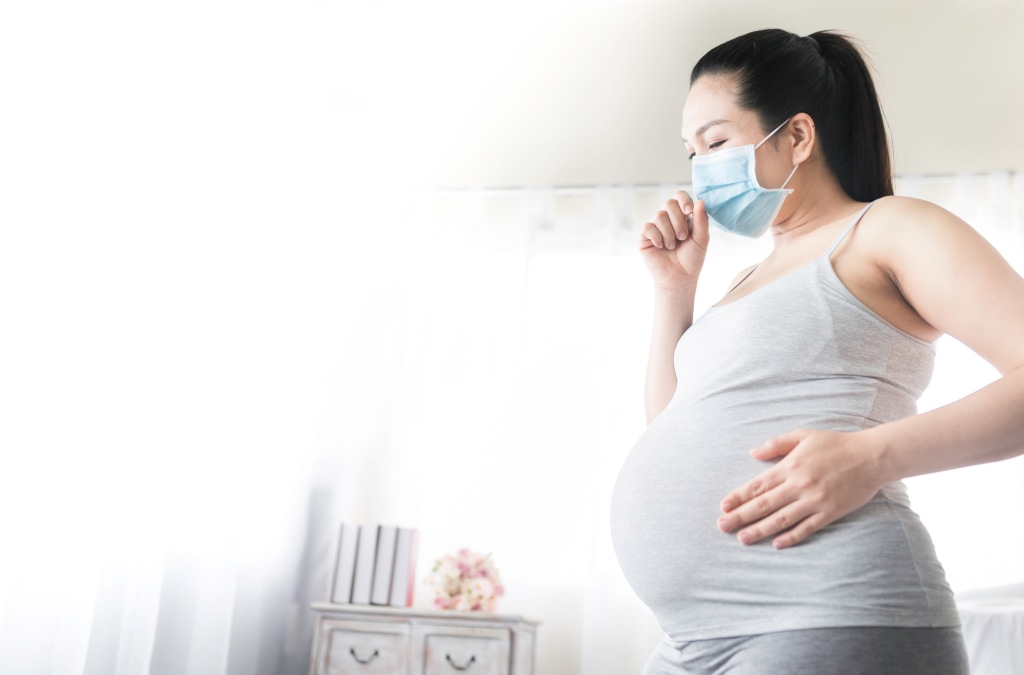What effect does Corona-virus have on pregnant women?
Generally, pregnant women do not appear to be more likely to be seriously unwell than other healthy adults if they develop the new coronavirus. It is expected the large majority of pregnant women will experience only mild or moderate cold/flu like symptoms. Cough, fever, shortness of breath, headache and loss of sense of smell are other relevant symptoms.
What effect will Corona-virus have on my baby if I am diagnosed with the infection?
As this is a very new virus, we are just beginning to learn about it. There is no evidence to suggest an increased risk of miscarriage. Emerging evidence suggests that transmission from a woman to her baby during pregnancy or birth (vertical transmission) is probable. There has been a report of two cases in which this seems likely, but reassuringly the babies were both discharged from hospital and are well. In all previously reported cases worldwide, infection was found at least 30 hours after birth.
It is considered unlikely that if you have the virus it would cause problems with your baby’s development, and none have been observed currently.
What can I do as a pregnant woman to reduce my risk of catching Corona-virus?
- Regular hand washing
- Use a tissue when you or anyone in your family coughs or sneezes, discard this and wash your hands
- Avoid contact with someone who is displaying symptoms of corona-virus. These symptoms include high temperature and/or new and continuous cough
- Avoid non-essential use of public transport when possible
- Work from home, where possible.
- Avoid large and small gatherings in public spaces, as infections spread easily in closed spaces where people gather together.
- Use telephone or online services in your country to contact your doctor or other essential services
I am pregnant, what do I need to do?
Pregnancy is a state of partial immune suppression which makes pregnant women more vulnerable to viral infections, and morbidity is higher even with seasonal influenza. The COVID-19 epidemic may have serious consequences for pregnant women. Therefore, it is important that pregnancy women and their families as well as the general public and healthcare providers, receive as accurate information as possible.
As a precaution, you should follow government advice about social distancing; stay away from public places and avoid anyone who has symptoms suggestive of corona-virus It is still considered necessary for pregnant women to go out for essentials: to attend antenatal appointments.
If you are in your third trimester (more than 28 weeks pregnant) you should be particularly attentive to social distancing and minimizing any contact with others.
Advice for pregnant healthcare workers before 28 weeks gestation
If you are in your first or second trimester (less than 28 weeks pregnant), with no underlying health conditions, you should practice social distancing but can choose to continue to work in a patient-facing role. If you choose to continue working, it is strongly recommended the necessary precautions are taken. You should avoid, where possible, caring for patients with suspected or confirmed coronavirus infection. If this is not possible, you should use personal protective equipment (PPE) and ensure a thorough risk assessment is undertaken.
Advice for pregnant healthcare workers after 28 weeks gestation, or with an underlying health condition
If you are in your third trimester (more than 28 weeks pregnant) or have an underlying health condition – such as heart or lung disease – we strongly recommend you avoid direct patient contact. It is better to work from home where possible, avoid contact with anyone with symptoms of corona-virus, and significantly reduce unnecessary social contact
Antenatal care for women with suspected or confirmed COVID-19:
Patients ‘risk for COVID-19 should be assessed prior to their hospital visit for antenatal care. In to suspected stable pregnant women, investigation and isolation should be implemented according health care protocol and antenatal care appointment should be re scheduled in 14 days.
Will I be able to breastfeed my baby if I have suspected or confirmed Corona-virus?
Yes. There is no evidence showing that the virus can be carried or passed on in breast milk. The well-recognized benefits of breastfeeding and the protection it offers to babies outweigh any potential risks of transmission of corona-virus through breast milk. Provided your baby is well and doesn’t require care in the neonatal unit, you will stay together after you have given birth so skin-to-skin and breastfeeding can be initiated and supported if you choose.
The main risk of breastfeeding is close contact between you and your baby, as if you cough or sneeze, this could contain droplets which are infected with the virus, leading to infection of the baby after birth.
When you or anyone else feeds your baby, the following precautions are recommended:
- Wash your hands before touching your baby, breast pump or bottles
- Try to avoid coughing or sneezing on your baby while feeding at the breast
- Consider wearing a face mask while breastfeeding, if available
- Follow recommendations for pump cleaning after each use
- Consider asking someone who is well to feed your expressed breast milk to your baby.
If you choose to feed your baby with formula or expressed milk, it is recommend that you follow strict adherence to sterilization guidelines. If you are expressing breast milk in hospital, a dedicated breast pump should be used.
References:
- https://www.rcog.org.uk/en/guidelines-research-services/guidelines/coronavirus-pregnancy/covid-19-virus-infection-and-pregnancy/#general
- Pregnancy and Covi-19: Saudi Society of Maternal-Fetal Medicine (SSMFM) Guidelines https://www.smfm.org/covid19



